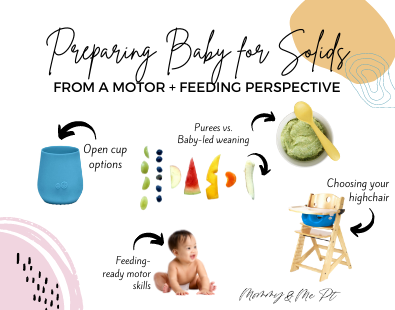
If your baby is in the ballpark of 4-6 months of age, you are probably starting to think about and prepare for introducing solid foods into your baby’s diet! Would you be surprised if I told you that there are some important motor skills to consider before taking the plunge into feeding skills?
Disclaimer: This information is from a motor standpoint ONLY! Feeding is *not* my area of expertise! Follow Playing at your Plate if you need a good resource for that! Also, please talk with your pediatrician and your child’s care team to determine the best time for your baby to start solids.
Why does it matter what motor skills your baby has before starting solids?
Motor skills are essential to laying a good foundation for deeding skills! Your baby needs core strength to support their body while also chewing/swallowing. They need coordination to be able to manage utensils and bring food to the mouth. They need good head/neck control to safely manage food in the mouth during chewing/swallowing! All of these skills I’m going to discuss set your baby up with good head control, a strong core and good coordination!! Feeding is a hard skill to learn, so we need to make sure we’re setting our babies up for as much success as possible!
Bringing toys to the mouth
This is pretty self-explanatory! You have to be able to coordinate bringing things to your mouth in order to self-feed!
I love using an o-ball to introduce bringing toys to the mouth! It is easy to grab and lightweight! Babies love sticking their tongues through the holds, which is actually a great oral motor skill to prep for feeding as well!
Once your baby can bring hands together at midline (around 12 weeks) you can start to introduce a lightweight toy by the mouth! This should naturally progress to being able to hold the toy at the mouth and eventually bring it there independently!
Good head control when held upright
Again, pretty self explanatory! If you don’t have good head control, you can’t hold your head up to safely manage food in your mouth!
Babies should develop decent head control around 8 weeks and it should just keep getting better from there! Around 4 months, you can start incorporating some vertical play into your baby’s day: doing the airplane hold is one of my faves! Facing your baby outwards and slightly leaning forward is a great tummy time alternative and a great way to improve head/neck/trunk control!!
Propping/Pushing through arms on the tummy
This skill is important because it indicates shoulder and neck strength! This will lay a foundation for your baby being able to bring those arms forward to grab food! Around the time babies are starting solids, that Superman reflex (aka “swimming on the tummy”) is also kicking in! Your baby needs to be able to come out of the Superman pose and prop on the arms so that they can translate that to feeding time!
Rolling Back to Belly
This skill is important for strengthening the core! It’s also an important skill to have before working on sitting skills. The rotational skills and coordination needed to roll back to belly are important for being stable in a highchair while reaching and bringing food to the mouth!
Sitting Alone for Short Periods of Time
I think this is the check box that hangs most people up! I don’t necessarily think your baby needs to be fully independently sitting for 10 minutes at a time before starting solids! But, I do think it is important that your baby can support herself in an upright position for several seconds because we need your baby to hold herself upright in a highchair!
If you need more support for any of the skills mentioned above, check out the highlights section of my Instagram page because I cover all of these in detail there! For more information on starting solids from both a motor and feeding perspective, check out the Feeding Guide that I wrote with Playing at Your Plate! This guide goes into depth about each of these motor skills with pictures and tips for each one, information about introducing solid foods, utensils, open cups and more!
Be the first to comment